In some cases, when you try to open an app/program or launch a game on your Windows 11 or Windows 10 PC, you may get an error prompt indicating a particular DLL or OCX file is missing or was not found. As a possible workable fix, you try to re-register the system file on your device but get the error RegSvr32 The module failed to load – this post is intended to help you with solutions to resolve this issue.
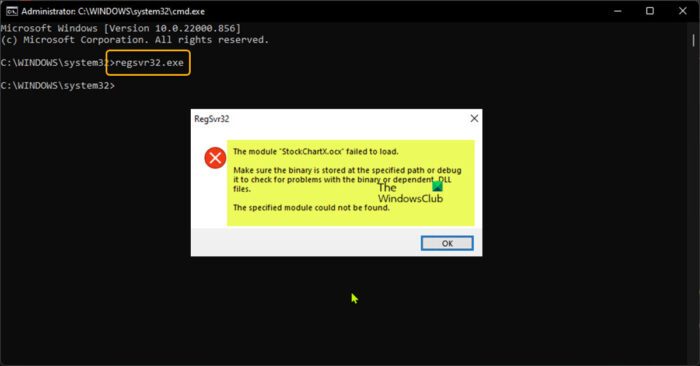
When this error is triggered on your system, you’ll receive a similar error message along the following lines
RegSvr32
The module <NameOfSystemFile> failed to load.
Make sure the binary is sorted at the specified path or debug it to check for problems with the binary or dependent .DLL files.
The specified module could not be found.
This error is most often encountered by gamers, who often install pirated copies of games on their computers. Typically, those modules that are responsible for licensing bypass or cracking require manual registration of missing DLLs. However, sometimes you may have to perform such actions when installing legitimately licensed programs.
RegSvr32 The module failed to load error
If you get The module failed to load RegSvr32 error when you try to register a DLL or OCX file on your Windows 11/10 PC, you can try our recommended suggestions below in no particular order (after you first go through the initial checklist) and see if that helps you resolve the issue on your system.
- Initial checklist
- Run regsvr32.exe utility with administrator privileges
- Check the location of desired library or component
- Replace or Restore the library or component
- Reset Windows 11/10
Let’s take a look at the description of the suggestions listed above.
1] Initial checklist
We suggest before you proceed with the solutions descibed below, you can run an SFC scan; since these libraries are system files, the scan will restore the health of the files if corrupted which might be the culprit here.
To run an SFC scan on your device, do the following:
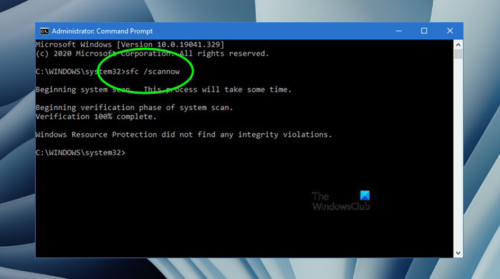
Open the command prompt in admin mode and type in the command below and hit Enter:
sfc /scannow
Depending on the outcome of the scan, you may have to follow up with the DISM scan to resolve any Windows system image corruption that might affect these system files.
To run the DISM scan, do the following:
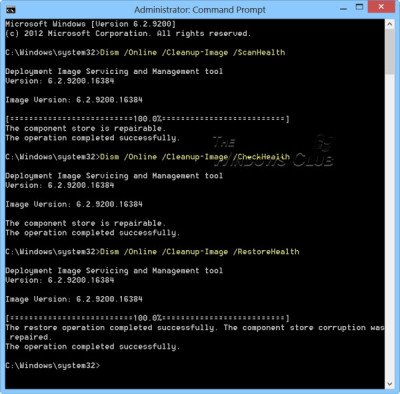
In an elevated CMD prompt, copy and paste the following commands and hit Enter after each line:
Dism /Online /Cleanup-Image /ScanHealth
Dism /Online /Cleanup-Image /CheckHealth
Dism /Online /Cleanup-Image /RestoreHealth
Depending on the severity of corruption, this operation takes 30 mins or more. Once you complete both scans and there’s no indication of any corruption of some sort, you can now try re-registering the system file that is triggering the error. If the file is successfully registered, then good, if not, you can continue with the rest of the suggestions outlined in this post.
Also, the regsvr32.exe file may be simply infected. So, to rule out this possibility, you can run a full system AV scan using Microsoft Defender or any reputable third-party security software.
Read: Failed to load DLL file on Windows computer
2] Check the location of desired library or component
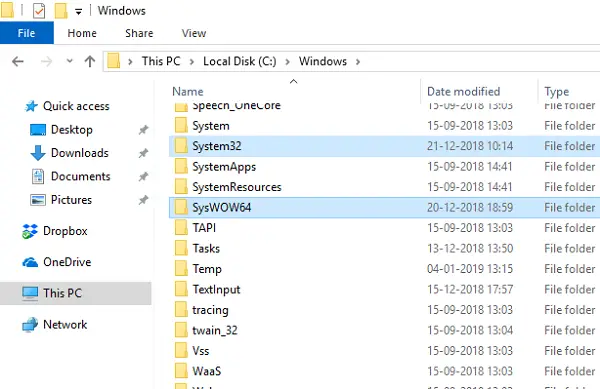
One of the most common reasons for this The module failed to load RegSvr32 error occurs on your Windows 11/10 PC owing to the inability to register the desired library or component is an error with the placement of this component. Even experienced users copy the desired file to the System32 directory, just out of habit. For 64-bit Windows, the SysWOW64 system folder is where all the components to register are located. So, make sure you copy the library to the correct folder and then run the regsvr32.exe utility in the elevated Command Prompt.
For some apps and most third-party games, you may have to look in the app/game installation folder on your local drive.
Read: Loadlibrary failed with error 126, 87, 1114, or 1455
3] Run regsvr32.exe utility with administrator privileges
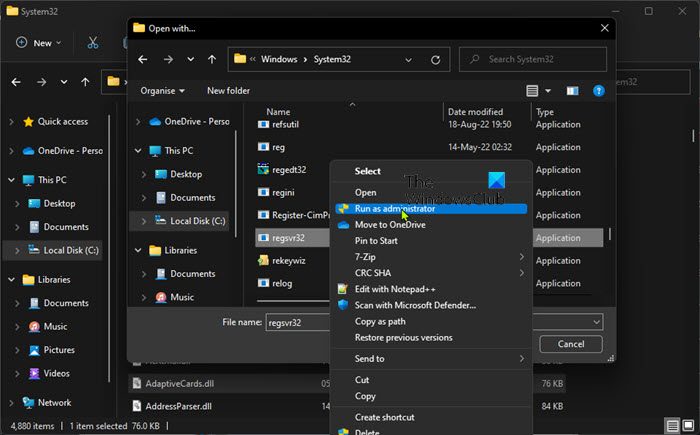
Yet another most common reason why you are likely to encounter the issue in focus, could be because the utility does not have sufficient permission or rights to perform some operations required when registering components. In this case, to resolve the issue make sure you’re logged in as an administrator before you run the utility in elevated command prompt mode. You can also run the regsvr32.exe utility with administrator privileges via File Explorer as follows:
- Press the Windows key + E to open File Explorer.
- In File Explorer, navigate to either of the directory paths below as the case may be to find the required library file with the .dll or .ocx extension:
C:\Windows\System32
C:\Windows\SysWOW64
- At the location, right-click on the system file.
- Select the Open with option from the context menu.
- Click Show apps on the warning prompt that appears.
- On the How do you want to open this file? menu, scroll down, and click Look for another app on this PC option.
- In the Open with window that opens, navigate to the System32 folder.
- At the location, right-click the regsvr32.exe file.
- Select Run as administrator from the context menu.
The command prompt will now open and execute the register of the desired system file. If the indicated actions did not help, it is likely the regsvr32.exe file is corrupted or there are Windows registry errors affecting the operation of this utility. This could often occur when the computer is turned off improperly, including due to a power outage.
Read: How to allow Standard users to Run a Program with Admin rights
4] Replace or Restore the library or component
If the location or placement of the library or component is in the correct file path and folder but the error prompt is triggered when you try to re-register the system file, then it’s likely the component itself is corrupted or missing. In this case, to rule out this possibility, you can replace or restore the system file. This you can do by heading over to Winbindex then downloading and then copying the file to the appropriate system folder. This service (native system files are available) allows users to see the information about Windows 11/10 OS files and download them from Microsoft servers. Alternatively, you can copy the system file from a recently updated working Windows 11/10 PC.
Read: The procedure entry point could not be located in the dynamic link library
5] Reset Windows 11/10
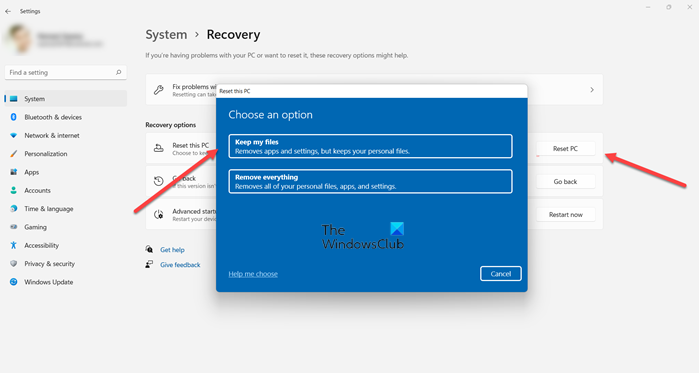
If all the suggestions above didn’t work to resolve the issue you are currently facing, then it’s likely you’re dealing with severe system corruption. In this case, the most applicable solution here is to reset Windows 11/10. In this case, the issue started recently, perhaps after installing a new Windows update, you can either uninstall the update or simply perform System Restore to get your system back to normal working condition.
I hope this helps!
Related post: DllRegisterServer was not found.
How do I fix regsvr32 the module failed to load?
Below are the most common solutions for Regsvr32 errors on Windows 11/10 PC:
- Open an elevated command prompt.
- If the 32-bit DLL is in the %systemroot%\System32 folder, move it to the %systemroot%\SysWoW64 folder.
- Run the following command: %systemroot%\SysWoW64\regsvr32 <full path of the DLL>.
How do I fix DLL errors in Windows 11/10?
If you get the User32.dll error during or after you install a program, a hardware component, or a driver, to resolve the issue, you can uninstall the program, the hardware component, or the driver. Then restart Windows, and reinstall the program, the hardware component, or the driver as the case may be.
Leave a Reply